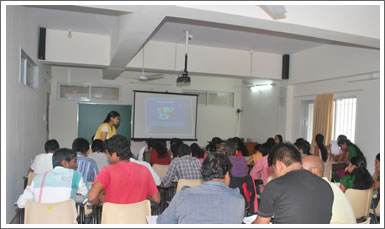Post Graduate Diploma in Journalism and Mass Communication
Programme Highlights
- Eligibility: Graduate with atleast55% marks (Co-ed)
- Medium of Instruction: English
- Tutorial Classes: Monday to Saturday, 3 hrs a day
- Duration: 1year
- Programme Fee: Rs.3600 per semester (inclusive of study material)
Career Options
The professional programmes in Journalism unfold new frontiers with jobs such as : broadcast journalist, editorial assistant, magazine journalist, newspaper journalist,press sub-editor, publishing copy-editor/proofreader, advertising copywriter, information officer, market researcher, multimedia specialist, public relations officer, writer.
In the information age of 21st century, journalism as a discipline and a domain of knowledge, as an industry and socio-cultural institution, has acquired greater attention and relevance. It has ushered in a ‘difference’ and ‘transformation’ in the global environment. If one believes in the saying ‘democracy is hollow without the right to dissent’, one needs to repose faith in the saying that journalism assures each citizen the right to credible, reliable and truthful information .Winston Churchill was not hyperbolic when he proclaimed “journalism is that guardian who never sleeps and protects the rights of people.” It is an undeniable fact that press is an autonomous institution and of late it has acquired the recognition of being the ‘fourth estate’.
Journalism has traversed through several phases, with a journalist enacting potent roles on ‘global –stage’ bringing ‘difference’ in the lives of people-as a mediator between the common man and the policy making elites, a moderator, entertainer, analyst, commentator, guardian of democracy and advocate of public dialogue.
These days Journalism and Mass Communication Programmes are offered by a large number of universities across the globe. The oft asked question regarding the relevance of journalism courses when several renowned journalists of the past and also in the present do not possess a degree in this field has been answered very well by Press Council of India ,that journalism schools groom students, along with vocational skills as they include critical and analytical approaches to journalism.
As part of the expansion and diversification programme , to blend literary studies and media studies for wider knowledge and enhance job prospects, the Department of English studies, DEI launched a One year Post Graduate Diploma in Journalism and Mass Communication Programme in 2009 in collaboration with the Madhubala Institute of communication and Electronics Media, New Delhi.
The course is currently (2013-14) run in both synchronous and distance mode. It is being run at 4 Distance Education Centers of DEI. The study material is supplied to the Study Centres during the registration process before the commencement of the classes. The study material consists of the print material and e- lessons captured on CDs and DVDs which are prepared by experts. The books are provided to students free of charge
|
COURSE NUMBER |
COURSE TITLE |
CREDITS |
CONT. EVAL |
END SEM. |
GRAND TOTAL |
|
DJM101 |
PRINCIPLES OF MASS COMMUNICATION |
4.0 |
150 |
50 |
200 |
|
DJM102 |
PRINT JOURNALISM |
4.0 |
150 |
50 |
200 |
|
DJM103 |
ADVERTISING & PUBLIC RELATIONS |
4.0 |
150 |
50 |
200 |
|
DJM104 |
PRINT JOURNALISM LAB |
4.0 |
150 |
50 |
200 |
|
DJM105 |
ADVERTISING & PUBLIC RELATIONS LAB. |
4.0 |
150 |
50 |
200 |
|
DJM106 |
DESIGN & GRAPHICS LAB |
4.0 |
150 |
50 |
200 |
|
DJM201 |
ELECTRONIC MEDIA (RADIO & T.V.) |
4.0 |
150 |
50 |
200 |
|
DJM202 |
NEW MEDIA |
4.0 |
150 |
50 |
200 |
|
DJM203 |
COMMUNICATION RESEARCH |
4.0 |
150 |
50 |
200 |
|
DJM204 |
ELECTRONIC MEDIA LAB. |
4.0 |
150 |
50 |
200 |
|
DJM205 |
NEW MEDIA LAB. |
4.0 |
150 |
50 |
200 |
|
DJM206 |
COMPREHENSIVE VIVA (PRESENTATION) |
4.0 |
150 |
50 |
200 |
Evaluation Pattern: The continuous evaluation system, an integral and vital part of DEI education system has been adopted in the same spirit in the Distance mode also.
Various Components of the Continuous Assessment System (As per the Institute Policy)
1. Internal Assessment Components of Theory Courses- Total 150 marks
(a)Quiz Tests- 3 best out of 4 (each of 15 marks)
(b)Class Tests- 2 best out of 3 (each of 35 marks)
(c)Home Assignment – 5 marks
(d)Class Assignment - 5 marks
(e)Additional Assignment/ Seminar and Group Discussion – 15 marks
(f) Attendance – 10 marks
2. End Semester Examination (External)- 50 marks
Total- 200 marks (Internal +External)
Assessment of Practical /Lab courses
1. Evaluation of work books/lab records + Practical Lab Assignments+ Seminar Presentations + Viva= 150 marks
2. End semester Examination (External) – 50 marks
Total – 200 marks (Internal + External)

